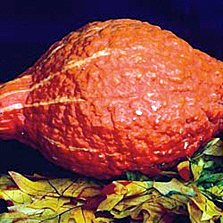You can find the food value of most things we eat at the Health Canada’s Nutrient File, a searchable database (easy to use) at this URL: http://webprod.hc-sc.gc.ca/cnf-fce/index-eng.jsp

I’ve compared current values of squash nutrients to those published in Adele Davis’s Let’s Eat Right to Keep Fit (1964) with food values from the USDA Nutritional Database. Food writers Thomas Pawlick (The End of Food, 2006) argues that food values in many vegetables have diminished over the past 45 years. My research shows that squash has fewer calories, less protein, fewer carbs and less iron and phosphorus than it did 50 years ago, but more fibre, more Vitamin A, and more Vitamin C. Then again, this is based on Winter squash, all varieties, so it’s possible that the promiscuous vegetable included in “all varieties” includes those of slightly different food values. It’s difficult to make exact comparisons.
Another point is that the varieties tested are presumably those from commercial growers. Comparisons for organic vs. non-organically grown fruit and veg, show organic vegetables winning every time with significantly higher food values than non-organic.
Wild Flight Farms, selling at the community market, is a good source for organic squash. PT Farm Market has organic butternut squash this week, too.



